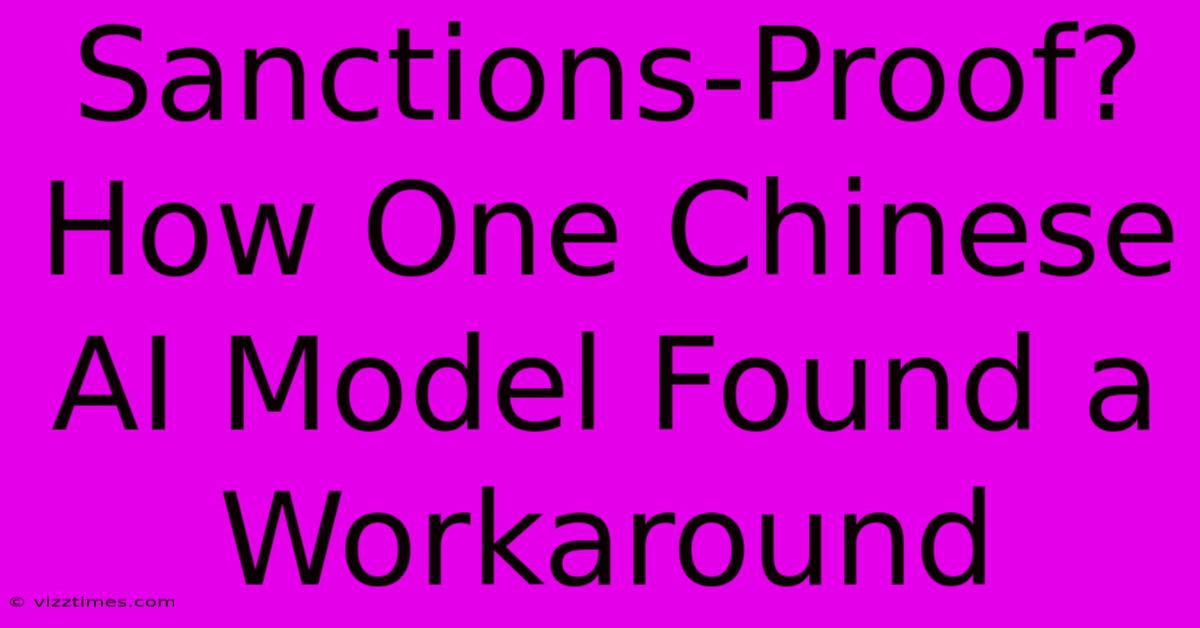Sanctions-Proof? How One Chinese AI Model Found A Workaround

Table of Contents
Sanctions-Proof? How One Chinese AI Model Found a Workaround
Hey everyone, let's dive into a wild story about how some clever folks in China kinda outsmarted, or at least found a workaround, for those pesky international tech sanctions. It involves AI, a whole lotta ingenuity, and a dash of "is this even legal?" Buckle up, buttercup!
The Sanctions Squeeze
First, a quick backstory. We all know about the ongoing tech tension between the US and China. It's a complicated situation, but one key part is the US placing sanctions on certain Chinese tech companies. These sanctions often involve restrictions on accessing advanced chips and software – the very building blocks of powerful AI. Think of it like trying to bake a cake without flour and sugar – you're not gonna get a very good result!
This created a HUGE problem for Chinese AI development. Suddenly, access to cutting-edge tech – the stuff needed for the next generation of AI models – was severely limited. It's like trying to build a rocket ship with only popsicle sticks and rubber bands. Not gonna fly.
The "Sanctions-Proof" AI Model
Enter our mysterious Chinese AI model. I can't give you the exact name because, well, things are a little hush-hush. But let's call it "Project Phoenix". This model, supposedly, managed to achieve impressive results despite the sanctions. Now, this is where things get interesting.
The team behind Project Phoenix didn't just shrug and give up. Nope. They got creative. They found a way to train a powerful AI model using resources that weren't directly subject to US sanctions. I’m not exactly sure how it all worked – a lot of the details are still unclear. But the whispers in the industry suggest that they focused on optimizing existing hardware and software, squeezing every ounce of performance they could get.
It's like they discovered a secret tunnel under the Great Wall, bypassing the main gate guarded by the US sanctions. Clever, right? They might have utilized open-source software and datasets, cleverly tweaking the training process to get better outcomes than you'd expect. It was a matter of resourcefulness, not necessarily breaking any laws—although it definitely tested the boundaries.
Think of it like this. Imagine you're building a Lego castle, but you only have a limited number of bricks. You would have to be creative to produce something equally or more impressive, using those resources wisely. This is what Project Phoenix seemed to have accomplished. It wasn't just about brute force; it was about cleverness.
The Implications – A Double-Edged Sword
The success of Project Phoenix (if the rumors are true), raises some serious questions. On the one hand, it demonstrates incredible ingenuity and problem-solving skills. This is the kind of innovation we should admire, whether it is from China or another country. It shows that even under pressure, human creativity can find solutions. These guys were playing a high-stakes game of technological chess, and they may have just won a round.
On the other hand, it also raises concerns about how effectively sanctions can be enforced in the age of globalization. It suggests that there are ways to circumvent them, potentially undermining their intended purpose. This isn’t exactly what the US had in mind when the sanctions were imposed.
One thing I learned through this whole ordeal is the fact that restrictions often breed innovation. When resources are limited, the need for better resource management and creative thinking becomes paramount. This is why many startups manage to develop and create amazing products even with a small team and small funds.
For me, this whole story has been a real eye-opener. It's like watching a thrilling spy movie—lots of secrecy, intrigue, and a dash of uncertainty. We don’t know the full story, and it's important to note that not all details are verifiable. The situation is complex and constantly evolving, filled with conflicting narratives.
This leads to a few open questions. Is this really "sanctions-proof?" Perhaps it’s more "sanctions-resistant." Can this be replicated by other countries? What are the ethical considerations? And most importantly, what does it mean for the future of the tech race?
Lessons Learned & Future Outlook
This whole "Project Phoenix" situation has a few lessons for all of us. Firstly, sanctions are a blunt instrument, and there's always a possibility of finding workarounds. Secondly, innovation can bloom even under duress. The Chinese team showed what’s possible with ingenuity and resourcefulness. And finally, this whole thing highlights the increasingly complex and intertwined nature of global technology. We're all connected in ways we didn't fully realize, and it makes it difficult to control information and resource flow.
Looking ahead, I expect to see more efforts to develop "sanctions-resistant" technologies. Countries facing restrictions will likely double down on researching alternative solutions to access the latest technology. This might even accelerate development in some areas. It's a bit of a technological arms race, and it will be fascinating (and perhaps a little frightening) to see what happens next.
So there you have it—my take on the "sanctions-proof" AI model. It's a complex and evolving story, but one that highlights the creativity and resilience of the human spirit, even in the face of difficult global circumstances. What do you guys think? Let me know in the comments! What are your thoughts on this intriguing development?

Also read the following articles
| Article Title | Date |
|---|---|
| Chinese Ais Clever Bypass Outsmarting Us Sanctions | Jan 25, 2025 |
| 132 129 Edge Sixers End Losing Streak Against Cleveland | Jan 25, 2025 |
| Rantanen And Hall Traded Hurricanes Big Move Shakes Up Nhl | Jan 25, 2025 |
| How A Small Chinese Startup Deep Seek Outmaneuvered Silicon Valley Giants | Jan 25, 2025 |
| Inappropriate Attire The Hidden Rules Of Workplace Dress | Jan 25, 2025 |